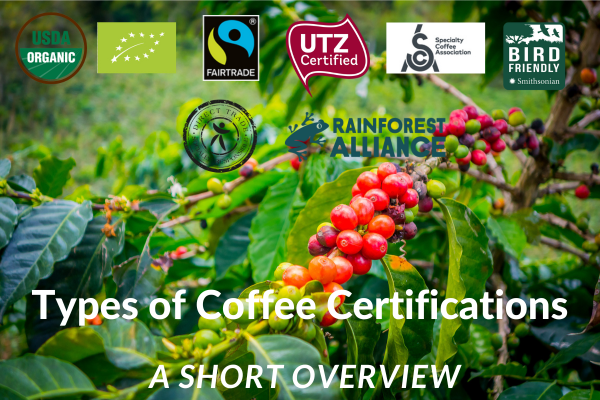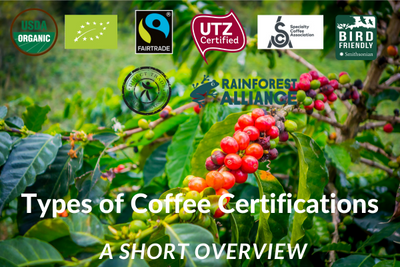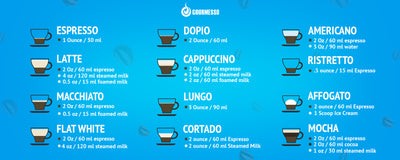There are several coffee certifications that exist and we at Gourmesso.com would like to present you with a short overview.
Over the years we have worked and sourced coffees from a variety of different certification bodies (in particular UTZ, Fairtrade, USDA and EU organic, but also Rainforest Alliance) for our different lines of Compatible Capsules for Nespresso Original Machines and the compostable Keurig K-Cup pods. Here is a first concise overview of some of these certifications and their focus areas:
- Fair Trade Certified: Ensures fair prices and social standards for small-scale farmers.
- Rainforest Alliance Certified: Focuses on environmental and social sustainability.
- UTZ Certified: Merged with Rainforest Alliance, emphasizing sustainable farming practices.
- Specialty Coffee Association (SCA) Certified: Offers various programs promoting excellence in specialty coffee.
- Organic Certified: Verifies organic farming methods without synthetic chemicals.
- Shade-grown Certified: Ensures coffee is grown under tree canopies, supporting biodiversity.
- Bird-Friendly Certified: Combines shade-grown and organic certifications to protect bird habitats.
- Direct Trade Certified: Emphasizes direct relationships between producers and roasters.
These certifications address environmental conservation, fair labor practices, and economic viability for farmers. They provide consumers with information to make ethical purchasing decisions and support sustainable practices in the coffee industry.
That was really a short glance at these certifications, and for all of you that would like to get into a bit more detail, please keep reading and check out the videos below about shade-grown certification and the bird-friendly coffee certification :)...
Fair Trade Certified:
Fairtrade is a certification program that aims to promote sustainable and fair trading practices for small-scale farmers and workers in developing countries. Fairtrade coffee certification ensures that coffee producers receive a fair price for their products and that they adhere to environmental and social standards.
To become certified by Fairtrade, coffee producers must meet certain requirements, including:
- Being a small-scale producer organization or a hired labor organization with democratic structures
- Adhering to Fairtrade's environmental standards, including minimizing the use of harmful chemicals and protecting natural resources
- Adhering to Fairtrade's social standards, including providing safe working conditions, ensuring fair wages, and prohibiting forced labor and child labor
In addition, coffee producers must sell their coffee to Fairtrade buyers who pay a Fairtrade Minimum Price, which is a price that covers the costs of sustainable production and ensures a minimum standard of living for the farmers. If the market price for coffee is higher than the Fairtrade Minimum Price, farmers receive the higher price.
Fairtrade coffee certification also includes a Fairtrade Premium, which is an additional amount of money paid by buyers to farmers that is used for community development projects, such as improving healthcare or education in the local community.
When coffee products are sold with the Fairtrade mark, it indicates that the coffee was produced and traded in accordance with Fairtrade standards. Fairtrade works with coffee producers in several countries, including Peru, Colombia, Ethiopia, and Honduras.
Editor note: In our webshop, we feature Nespresso compatible espresso pods from Gourmesso that are fairtrade certified.
Rainforest Alliance Certified:
Rainforest Alliance coffee certification is a type of certification that verifies that the coffee has been produced in a way that promotes environmental, social, and economic sustainability. The Rainforest Alliance is a non-profit organization that works to conserve biodiversity and promote sustainable livelihoods in the regions where coffee is grown.
Rainforest Alliance coffee certification is typically issued by third-party organizations that are accredited by government bodies or other regulatory organizations. In order to be certified, coffee farmers must follow a set of standards and criteria that promote sustainability and protect the environment. These standards may include:
- Protecting biodiversity and maintaining healthy ecosystems
- Conserving water resources and reducing pollution
- Using agroforestry and other sustainable farming practices
- Providing safe and healthy working conditions for workers
- Supporting local communities and promoting social equity
- Encouraging transparency and accountability in the supply chain
- In addition to meeting these standards, coffee farmers must also maintain detailed records of their farming practices and undergo regular inspections by the certification body to ensure ongoing compliance.
Rainforest Alliance coffee certification is important because it helps to promote sustainable coffee production and support the well-being of coffee farmers and their communities. By promoting sustainable farming practices and protecting the environment, Rainforest Alliance coffee can help to conserve biodiversity and promote a healthier planet.
When coffee products are sold with a Rainforest Alliance certification label, it indicates that the coffee was produced in accordance with the Rainforest Alliance standards and has been verified by a third-party certification organization. The Rainforest Alliance also works to promote consumer awareness and education about sustainability issues in the coffee industry.
Editor note: In our webshop, we feature compostable Keurig KCup pods from Glorybrew which are Rainforest Alliance certified.
UTZ Certified:
UTZ is a certification program for sustainable coffee production. It was founded in 2002 by a group of coffee roasters and other stakeholders in the coffee industry who wanted to promote sustainable farming practices and improve the livelihoods of coffee farmers.
UTZ works with farmers, companies, and other stakeholders in the coffee supply chain to ensure that coffee is produced in a way that is environmentally and socially responsible. The UTZ program sets standards for sustainable coffee production, and farms and supply chain companies can apply for certification if they meet these standards.
The UTZ standards cover a range of topics, including:
- Environmental management, including soil and water conservation, waste management, and biodiversity conservation
- Social responsibility, including fair labor practices, worker health and safety, and community engagement
- Economic viability, including farm management practices, productivity, and quality control. The UTZ program provides training and support to farmers and supply chain companies to help them meet these standards. Certified farms and companies can use the UTZ label on their coffee products to demonstrate their commitment to sustainability.
Rainforest Alliance and UTZ actually merged in 2018 to create a new organization called the Rainforest Alliance. The merger brought together two leading sustainability certification programs for agriculture and forestry, with Rainforest Alliance focusing on environmental and social sustainability, and UTZ focusing on sustainable farming practices.
The new Rainforest Alliance organization offers a single certification program that covers a range of crops, including coffee, cocoa, tea, and bananas. The certification standards are based on the Sustainable Agriculture Network (SAN) standards, which were originally developed by Rainforest Alliance, and have been updated to include the best practices from UTZ.
The Rainforest Alliance certification program includes requirements for environmental conservation, social welfare, and economic viability, and it aims to help farmers improve their livelihoods while also protecting natural resources and promoting biodiversity. Certified products can carry the Rainforest Alliance Certified seal to indicate that they meet these standards.
The merger between Rainforest Alliance and UTZ was intended to create a stronger, more efficient organization with a broader reach and greater impact on sustainability in the agriculture and forestry sectors.
Specialty Coffee Association (SCA) Certified:
The Specialty Coffee Association (SCA) is a non-profit organization that represents the specialty coffee industry worldwide. The SCA offers several certification programs that aim to promote quality and sustainability in the specialty coffee industry.
The SCA's certification programs include:
- Coffee Skills Program: The Coffee Skills Program provides education and training in various aspects of coffee, including coffee tasting, roasting, brewing, and barista skills. The program offers different levels of certification, from foundation to professional.
- Certified Home Brewer: The Certified Home Brewer program provides education and training in coffee brewing techniques for home coffee enthusiasts. The program includes online education modules and a practical exam.
- Coffee Sustainability Program: The Coffee Sustainability Program provides education and training in sustainability practices for coffee businesses. The program covers topics such as environmental conservation, social responsibility, and economic sustainability.
- Coffee Quality Institute: The Coffee Quality Institute offers certification programs for coffee quality, including the Q Grader certification, which is a rigorous program that trains coffee professionals to evaluate coffee quality through cupping and sensory analysis.
The SCA also offers a Certified Commercial Coffee Equipment program, which certifies commercial coffee equipment for quality and safety standards.
Overall, the SCA's certification programs aim to promote excellence and sustainability in the specialty coffee industry by providing education, training, and certification opportunities for coffee professionals and enthusiasts.
Organic Certified:
Organic coffee certification is a type of certification that verifies that the coffee has been grown and processed using organic farming methods. Organic farming methods are those that avoid the use of synthetic pesticides, fertilizers, and other chemicals, and instead rely on natural methods to manage pests and maintain soil fertility.
Organic coffee certification is typically issued by third-party organizations that are accredited by government bodies or other regulatory organizations. In order to be certified organic, coffee farmers must follow a set of strict guidelines and standards, which may include:
- Avoiding the use of synthetic pesticides and fertilizers
- Using organic compost and other natural methods to maintain soil fertility
- Practicing crop rotation and other methods to manage pests and diseases
- Protecting water resources and wildlife habitat
- Following fair labor practices and supporting workers' rights
In addition to meeting these standards, coffee farmers must also maintain detailed records of their farming practices and undergo regular inspections by the certification body to ensure ongoing compliance.
Organic coffee certification is important because it helps to promote environmentally sustainable farming practices and protect the health of coffee workers and consumers. It also provides consumers with a way to make informed choices about the products they purchase and support sustainable agriculture and food systems.
When coffee products are sold with an organic certification label, it indicates that the coffee was produced in accordance with the organic farming standards and has been verified by a third-party certification organization. Some of the most common organic coffee certification programs include USDA Organic, EU Organic, and JAS Organic.
Shade-grown Certified:
Shade-grown coffee certification is a type of certification that verifies that the coffee has been grown in a way that supports biodiversity and protects forests. Shade-grown coffee is typically grown under a canopy of trees, which provides a habitat for birds, insects, and other wildlife, and helps to maintain the ecological balance of the coffee-growing region.
Shade-grown coffee certification is typically issued by third-party organizations that are accredited by government bodies or other regulatory organizations. In order to be certified as shade-grown, coffee farmers must follow a set of guidelines and standards that promote forest conservation and support biodiversity. These standards may include:
- Maintaining a diverse forest canopy that provides habitat for wildlife
- Avoiding the use of synthetic pesticides and fertilizers that can harm wildlife and the environment
- Using organic farming methods to maintain soil fertility and protect water resources
- Supporting the rights of workers and local communities
In addition to meeting these standards, coffee farmers must also maintain detailed records of their farming practices and undergo regular inspections by the certification body to ensure ongoing compliance.
Shade-grown coffee certification is important because it helps to promote sustainable farming practices and protect the ecological balance of coffee-growing regions. By preserving forests and supporting biodiversity, shade-grown coffee can help to maintain healthy ecosystems and provide habitat for a variety of wildlife species.
When coffee products are sold with a shade-grown certification label, it indicates that the coffee was produced in accordance with the shade-grown standards and has been verified by a third-party certification organization. Some of the most common shade-grown coffee certification programs include Bird-Friendly, Rainforest Alliance, and Smithsonian Migratory Bird Center.
MAGNETFILM produced a very informative documentary about shade-grown coffee and its positive impacts on local communities, halting deforestation, and protecting wildlife habitats. Check it out here:
Bird-Friendly Certified:
Bird-Friendly Coffee certification is a sustainability certification program that focuses on promoting bird conservation through sustainable coffee farming practices. It was developed by the Smithsonian Migratory Bird Center (SMBC) in the United States.
The certification is based on the SMBC's Bird-Friendly habitat standards, which were developed in partnership with coffee farmers, ornithologists, and conservationists. These standards require that coffee is grown in a way that provides habitat for migratory birds and promotes biodiversity, while also protecting natural resources and promoting sustainable farming practices.
To be certified as Bird-Friendly Coffee, coffee farms must meet the following criteria:
- Have a shade cover that provides a habitat for migratory birds and supports biodiversity
- Be certified organic, which prohibits the use of synthetic pesticides and fertilizers
- Be managed using sustainable farming practices, such as composting, water conservation, and soil conservation
- Be audited by a third-party certifier to ensure compliance with the Bird-Friendly standards
Bird-Friendly Coffee is the only certification program that requires shade cover and organic farming practices for coffee production. The program aims to protect and conserve bird species that rely on coffee farms for their habitat, as well as promote sustainable farming practices that benefit farmers and their communities.
When coffee products are sold with the Bird-Friendly Coffee label, it indicates that the coffee was produced in accordance with the Bird-Friendly habitat standards. Bird-Friendly Coffee is grown in several countries, including the United States, Mexico, Colombia, and Peru.
Please check out this short video from Smithsonian Global about Bird Friendly Coffee:
Direct Trade Certified:
Direct Trade Certified coffee is a certification program that focuses on building direct relationships between coffee producers and roasters, with an emphasis on transparency, quality, and sustainability.
Unlike other certification programs, Direct Trade does not have a set of specific standards or requirements that producers must meet in order to be certified. Instead, the program emphasizes the importance of building strong, direct relationships between coffee producers and roasters, and encourages roasters to develop their own sourcing standards that align with their values and priorities.
Direct Trade Certified coffee is typically produced by small-scale farmers who are committed to sustainable farming practices, including environmental conservation and fair labor practices. Roasters who participate in the program often visit the farms and work directly with producers to establish long-term relationships based on mutual trust and respect.
Direct Trade Certified coffee is often sold at a premium price, which reflects the higher quality of the coffee and the commitment to sustainability and transparency. Roasters who participate in the program are often committed to paying fair prices to producers and investing in community development projects in the coffee-growing regions.
One of the key benefits of Direct Trade Certified coffee is that it allows roasters to build direct relationships with coffee producers, which can help to ensure that farmers receive a fair price for their products and that the coffee is produced in a sustainable and socially responsible way. It also allows consumers to make more informed choices about the coffee they purchase, and to support roasters and farmers who share their values and priorities.




